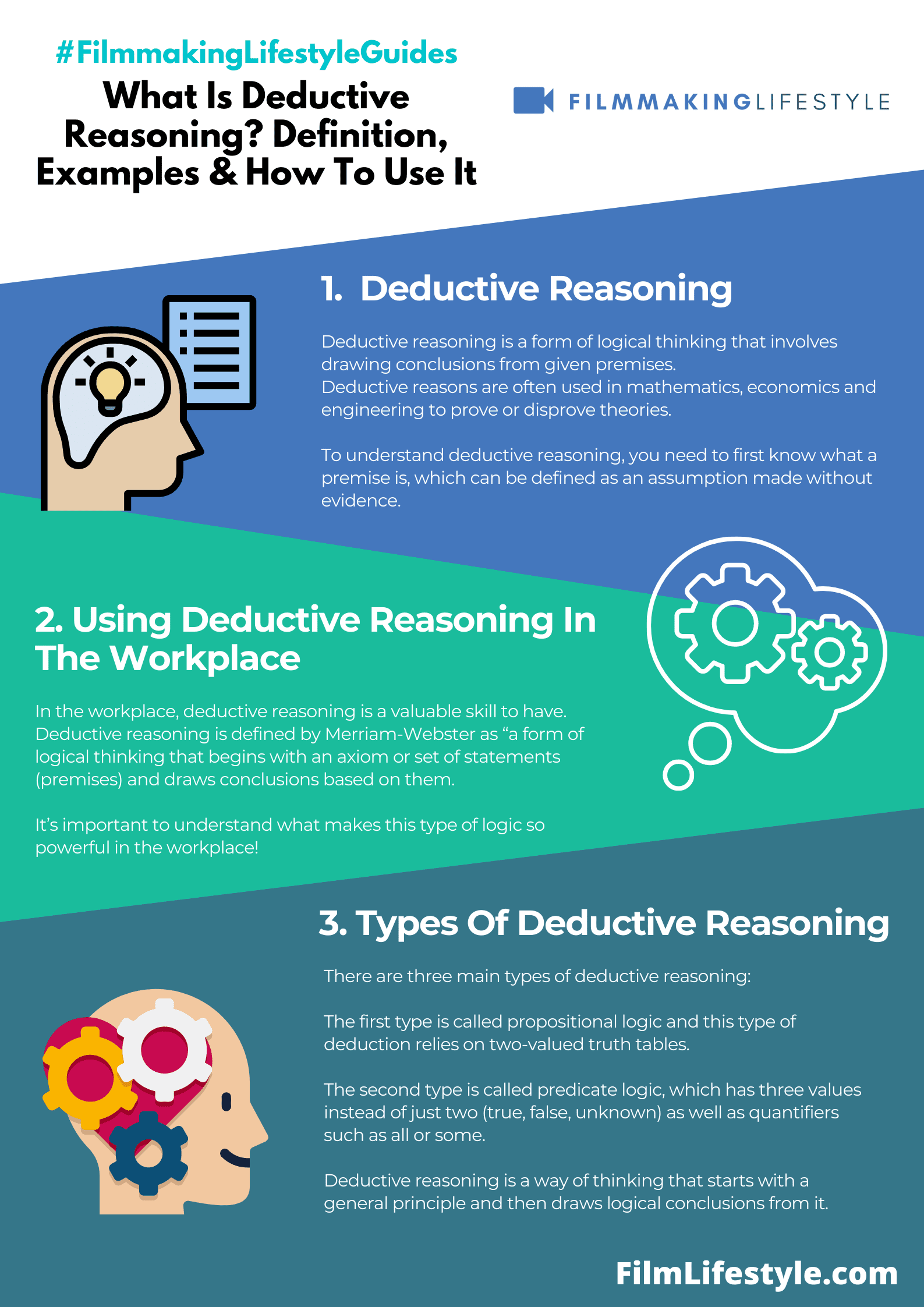Which Option Is The Clearest E Ample Of Deductive Reasoning
Which Option Is The Clearest E Ample Of Deductive Reasoning - Deductive reasoning is concerned with syllogisms in which the conclusion follows logically from the premises. For example, the inference from the premises all men are mortal and socrates is a man to the conclusion. Begins with a set of specific observations or facts and moves to a broader perspective or generalization. Deductive reasoning in geometry in geometry, deductive reasoning allows us to draw conclusions based on given facts, definitions, postulates, and previously proven theorems. The process of deductive reasoning starts with a general statement or premise, and then moves towards a specific conclusion that logically follows from the initial statement. Medical conditions and injuries that affect your brain may make it hard for you to process information and make decisions. And the arguments are sound when the conclusion, following those valid arguments, is true. Web the option that is the clearest example of deductive reasoning is: Arguments in inductive reasoning are strong or weak. The second type of reasoning is called deductive reasoning, or deduction, a type of reasoning in which a conclusion is based on the combination of multiple premises that are generally assumed to be true.
Deductive arguments have to meet strict conditions. For instance, deductivists might construe “\ (2 + 2 = 4\)” as. In other words, deductive arguments are logically watertight: All humans are mortal (premise), socrates is a human (premise), therefore, socrates is mortal (conclusion). Web deductive reasoning, or deduction, is the process of using a group of true premises to draw a conclusion that is also true. Web deductive reasoning is when a conclusion must be true given true premises for that conclusion. A deductive argument is only valid if the premises are true.
Inductive reasoning, also called induction, constructs or evaluates general prepositions derived from specific examples. Web deductive reasoning is a logical approach where you progress from general ideas to specific conclusions. Web deductive reasoning is when a conclusion must be true given true premises for that conclusion. General principle a is true. It is a method of reasoning in which basic principles or premises are used to draw particular conclusions or predictions logically.
Deductive reasonging draws logical conclusion from valid arguments. Web deductive reasoning stands as a critical method for drawing reliable conclusions from true premises through a logical and stepwise process. On the other hand, inductive reasoning is when the premises provide support for a conclusion; It’s often contrasted with inductive reasoning, where you start with specific observations and form general conclusions. Web deductive reasoning is a logical approach where you progress from general ideas to specific conclusions. Web deductive reasoning, or deduction, is the process of using a group of true premises to draw a conclusion that is also true.
In deductive reasoning, you use general ideas or premises to come to a specific conclusion. Begins with a set of specific observations or facts and moves to a broader perspective or generalization. Deductive reasoning serves as a major component of logical thinking that is used in problem solving, decision making, and critical analysis. As a result of this, it is important to note that: In other words, deductive arguments are logically watertight:
Arguments in inductive reasoning are strong or weak. Web deductive reasoning is when a conclusion must be true given true premises for that conclusion. Deductive reasoning is the process of reasoning from general statements to reach a logical conclusion. If the premises are true, the conclusion must be true.
Arguments In Inductive Reasoning Are Strong Or Weak.
A deductive argument is only valid if the premises are true. Web deductive reasoning is the mental process of drawing valid inferences. Deductive reasoning is concerned with syllogisms in which the conclusion follows logically from the premises. Revised on 10 october 2022.
In Other Words, Deductive Arguments Are Logically Watertight:
Deductive arguments have to meet strict conditions. And the arguments are sound when the conclusion, following those valid arguments, is true. Deductive reasoning is the process of reasoning from general statements to reach a logical conclusion. Web the option that is the clearest example of deductive reasoning is:
Deductive Reasoning In Geometry In Geometry, Deductive Reasoning Allows Us To Draw Conclusions Based On Given Facts, Definitions, Postulates, And Previously Proven Theorems.
If the premises are true, the conclusion must be true. Any person i meet is legally my equal. It is a method of reasoning in which basic principles or premises are used to draw particular conclusions or predictions logically. The following example about knut makes this process clear:
It Understands A Mathematical Sentence \ (S\) As Expressing The Claim That \ (S\) Deductively Follows From Appropriate Axioms.
It’s often contrasted with inductive reasoning, where you start with specific observations and form general conclusions. All people are equal under the law. Web deductive reasoning is a logical approach where you progress from general ideas to specific conclusions. General principle a is true.



![[DIAGRAM] Procedure Of Deductive Reasoning Venn Diagrams](https://i2.wp.com/image1.slideserve.com/1852910/deductive-vs-inductive-reasoning-l.jpg)


